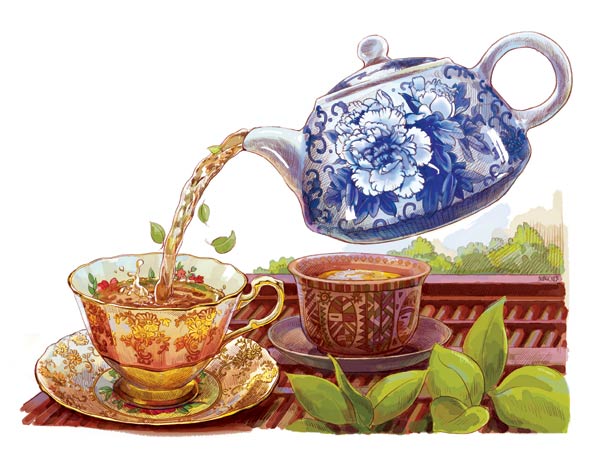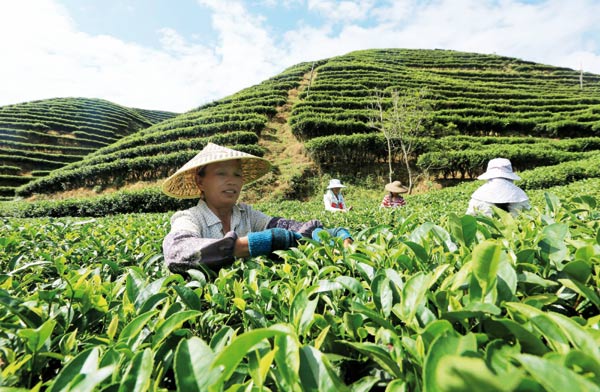Testing time for China's tea growers
Updated: 2013-12-02 00:08
By Todd Balazovic and Li Aaoxue (China Daily)
|
|||||||||||
Chinese producers take the less traveled road in Africa and Europe for sustained growth, as Todd Balazovic and Li Aoxue report.
 |
|
Song Chen / China Daily |
What started 5,000 years ago with a haphazard gust of wind dropping foliage into the boiling pot of a wandering Chinese emperor has brewed into a cultural cornerstone worth billions in any currency.
China may be the world's largest tea producer — growing about 2 million tons annually — but international demand for leaves from the country best known for its exports is a fraction of what it produces, with most of the quality product sold domestically.
Although it accounts for more than 40 percent of the tea produced in the world every year, China exports a tiny fraction of the annual crop yield.
Tea producers from countries such as Kenya, India and Sri Lanka dominate the global export market, producing mid- to low-quality teas for mass consumption in the US and Europe.
The reason for China's small portion of the pot is simple — for Western drinkers unaccustomed to the sophisticated process of fine tea appreciation, the price tag of Chinese tea is too steep.
"There is a culture behind Chinese tea that is not found in the West," said Li Zongjian, founder of Lijiang-based tea producer Li Liang Xi, at the recent China Tea Expo in Beijing.
Li, who earned his degree studying the ceremony, growing process and health benefits of tea, says much more goes into Chinese tea than simply creating and consuming.
Perched on a bamboo stool before a meticulously carved wooden serving table, Li is eager to prove his point, theatrically clinking together heated cups as he prepares for a Chinese tea ceremony.
Carefully pinching a dark chunk of Pu'er tea, fermented black tea leaves made famous by China's southern Yunnan province, he holds them under his nose, inhaling deeply.
With a look of satisfaction, he begins preparing the leaves in the way most of the Western world is familiar — boil water, add tea.
But before the brewing process is complete, Li dumps the entire pot of $150 tea into a hidden drain on his serving table — evoking the obvious question "What was the reason for that?"
The first boil only works to awaken the tea leaf, he explains.
This takes place two more times before he serves what he has deemed an appropriate cup of tea according to the gongfucha serving method he spent years perfecting.
"When Chinese people drink tea, they don't consume it like a product. We have tea as a part of our culture, so the standard is high," Li says, continuing his showmanship with an exaggerated sip from the steaming glass.
"For Westerners, it's simply a beverage."
Although it's hard to put a price on culture, Li can sell 100 grams of his hand-picked teas for between $100 and $1,500, depending on the age of the leaves and method by which they were grown — compared with $28 for the same quantity of popular UK tea brand Twinings.
|
 Farmers picking tea leaves in Dongling village, Liuzhou city, in the Guangxi Zhuang autonomous region.[Photo / China Daily]
|
Related Stories
Time for tea 2013-11-29 14:44
More should be done to spread tea aroma 2013-11-29 14:44
Fuding savors success in white tea 2013-11-15 09:13
How to make white tea 2013-11-15 07:41
China Int'l Tea Expo kicks off in S China's Nanning 2013-11-11 14:39
Qingdao Autumn Tea Fair kicks off 2013-11-07 10:56
Today's Top News
China outlines diplomatic priorities for 2014
Continuity in DPRK expected
Austria's new government sworn in
Putin's dream of rejuvenation
Shoppers dropping department stores
China's growth to help markets
Clashes with US can be avoided: FM
Kerry offers Hanoi aid in maritime dispute
Hot Topics
Lunar probe , China growth forecasts, Emission rules get tougher, China seen through 'colored lens', International board,
Editor's Picks

|

|

|

|

|

|





